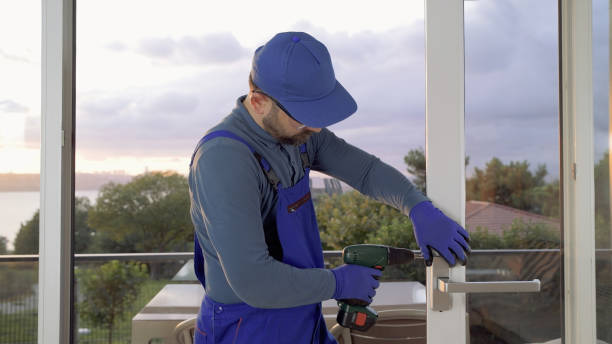Windows are essential components of any home, providing natural light, ventilation, and aesthetic appeal. However, over time, windows can become damaged or deteriorated due to weather, wear and tear, or simply aging. When issues arise, homeowners often face a critical decision: should they opt for window repairs or go for a full window replacement? While replacement is sometimes necessary, there are many cases where repairs can be a more cost-effective and practical solution.
In this article, we’ll explore when it makes sense to choose window repairs over full replacement, examining common window issues and when each approach is appropriate.
1. Understanding the Condition of Your Windows
The first step in deciding whether to repair or replace your windows is assessing their current condition. This involves looking at the following key factors:
- Age of the Window: Windows have a typical lifespan of 15 to 30 years, depending on the material and maintenance. If your windows are still relatively new or in good condition but have minor issues, repairs might be a suitable solution. However, if they’re reaching the end of their lifespan, replacement may be more beneficial.
- Extent of the Damage: The severity and type of damage play a big role in the decision-making process. Small issues, such as broken panes or malfunctioning hardware, can usually be repaired. However, if the damage is extensive, such as rot in the frame or major structural problems, replacement may be necessary.
2. When to Opt for Window Repairs
In many situations, window repairs can extend the life of your windows and save you the cost of full replacements. Here are some common scenarios where repairs are a practical solution:
a. Minor Glass Damage or Cracks
If your window panes have small cracks or chips, especially in single-pane windows, a simple glass repair or replacement of the individual pane can fix the issue without the need for an entirely new window. Cracked or broken glass may seem like a major issue, but in many cases, the window frame remains in good condition, making repairs a more affordable option.
- Cost-Effective: Repairing small cracks or replacing individual panes is far less expensive than installing a new window.
b. Foggy Windows Due to Seal Failure
Double-pane windows are designed with an insulating layer of gas (usually argon or krypton) between the panes. When the seal between these panes fails, moisture can enter and cause the glass to fog up, reducing energy efficiency and obscuring your view.
- Restore Energy Efficiency: Replacing the failed seal can restore the insulating properties of the window, preventing further energy loss.
- Improve Visibility: Repairing foggy windows clears up the condensation, allowing you to enjoy a clear view once again.
c. Hardware Issues
Many window problems are related to the hardware, such as locks, hinges, and cranks. Over time, these components can wear out, become loose, or malfunction, making the window difficult to open or close. These issues are typically easy to fix, with replacement parts readily available for most window styles.
- Increased Security: Fixing broken locks or latches enhances the security of your home, keeping your family safe.
- Better Functionality: Repaired hinges and cranks allow you to operate your windows more smoothly, improving ventilation and ease of use.
d. Minor Frame Damage
Wooden and vinyl window frames can develop small cracks, dents, or rot over time, particularly in areas that are exposed to moisture. In many cases, these issues can be repaired without replacing the entire window. For wood frames, small sections can be patched or filled, while vinyl frames can be repaired with a sealant.
- Cost Savings: Repairing frame damage is significantly less expensive than replacing the entire window, especially for wood windows that can be costly to replace.
e. Drafty Windows
If you’re noticing drafts around your windows, it doesn’t necessarily mean you need to replace them. In many cases, the cause of the draft is simply worn-out weatherstripping or old caulking. Replacing these seals can eliminate drafts and improve your home’s energy efficiency without the expense of full window replacement.
- Energy Efficiency: Addressing drafts by repairing weatherstripping and caulking helps prevent heat loss, lowering your energy bills.
- Affordable Fix: These repairs are relatively inexpensive and can be done quickly, making them a smart choice for homeowners looking to improve comfort without a large investment.
3. When to Consider Full Window Replacement
While repairs can solve many window issues, there are times when replacement is the better option. If your windows are suffering from more severe problems, it may be more cost-effective and practical to replace them entirely. Here are some signs that indicate a full window replacement may be necessary:
a. Severe Structural Damage
If your window frames are significantly damaged—such as rotting wood, cracked vinyl, or warped frames—repairs may not be enough. Structural issues can compromise the window’s ability to insulate and protect your home from the elements, leading to energy loss and potential water damage. In this case, full replacement is often the best solution.
- Prevent Further Damage: Replacing windows with severe structural problems prevents more serious issues like leaks, mold growth, and increased energy bills.
- Enhanced Durability: New windows will offer better protection against the elements and will last longer than attempting to repair severely damaged frames.
b. Poor Energy Efficiency
Older windows, especially single-pane windows, are not as energy-efficient as modern double- or triple-pane options. If you’re experiencing high energy bills due to heat loss, window replacement may be the best way to improve your home’s insulation and reduce energy costs. Newer windows are designed with advanced materials and technology to enhance energy efficiency.
- Long-Term Savings: While replacing windows is a significant investment, the energy savings you’ll achieve over time can offset the initial cost.
- Improved Comfort: New windows help regulate indoor temperatures more effectively, keeping your home more comfortable year-round.
c. Multiple Issues
If your windows have multiple issues, such as cracked panes, rotting frames, and faulty hardware, replacing the entire window may be more practical than repairing each problem individually. In these cases, the cost of multiple repairs can add up, making replacement the more economical choice.
- Save Time and Money: Instead of paying for multiple repairs, replacing the window in its entirety offers a more permanent and efficient solution.
- Increased Home Value: Installing new windows not only improves your home’s energy efficiency and comfort but also boosts its curb appeal and resale value.
d. Outdated Style
If your windows are outdated and don’t match the aesthetic of your home, replacement can provide an opportunity to update your home’s appearance. Modern windows come in a wide range of styles, materials, and finishes, allowing you to customize the look to suit your taste and enhance your home’s curb appeal.
- Enhance Aesthetics: Replacing old, worn-out windows with modern designs can give your home a fresh, updated look.
- Increase Property Value: Upgrading to newer, more stylish windows can increase your home’s market value, making it more attractive to potential buyers.
Conclusion
Deciding whether to repair or replace your windows ultimately depends on the specific issues you’re facing. For minor problems like cracks, hardware malfunctions, or drafts, repairs are often the most cost-effective and practical solution. However, if your windows are suffering from severe damage, poor energy efficiency, or multiple issues, full replacement may be the better option in the long run. By carefully assessing the condition of your windows and consulting with a professional, you can make the best choice for your home and budget.



